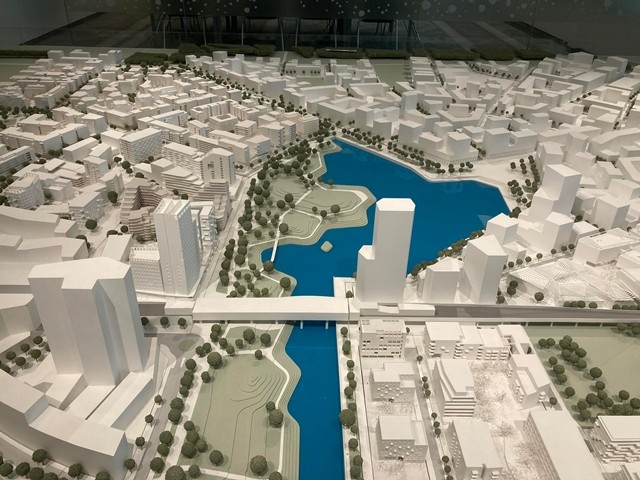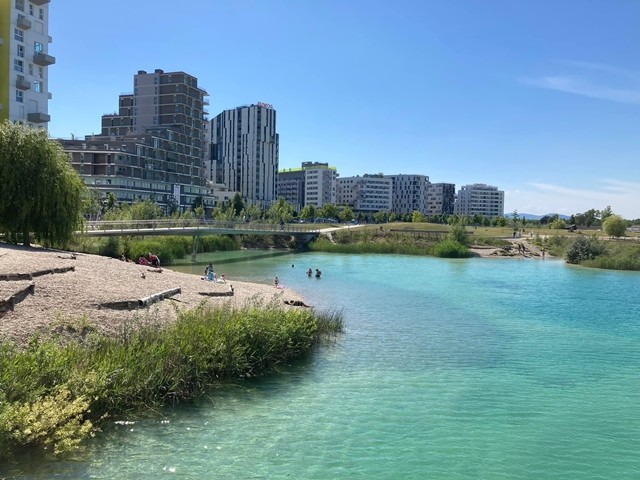Thessaloniki gets ready for its metro launch in November
The underground rapid transit lines have been under construction for almost two decades due to various project delays
 TheMayor.EU logo
TheMayor.EU logo City authorities claim that the climate crisis is already a factor in planning, with long droughts, interrupted by heavy rainfalls, becoming commonplace
Last week, Budapest was battered by a wave of heavy rain that caused a flash flood in the city. With the effects of climate change becoming more pronounced, the Hungarian capital is experiencing extreme weather shifts more frequently.
According to a statement by city authorities, the climate crisis manifests itself in the Budapest region with long periods of droughts, which are only cut by flash floods and heavy rainfalls. This, they say, is quite similar to the situation in Vienna, which has inspired officials to copy much from the Austrian capital’s sponge city model.
Recently, the city sent a team of experts on a fact-finding mission to Vienna, where they visited the city’s climate adaptability infrastructure projects. Now, Budapest is preparing its own answer to the changing climate.
In Budapest, this project is called ‘LIFE - Urban Rain’ (LIFE – Városi Eső) and it aims to change the way the city handles rain. The standard idea for many drainage systems involves moving water away from the urban area as quickly as possible through a system of drains and sewers and feeding it to rivers.
The sponge city concept, however, aims to reframe that into retaining as much water as possible within the city limits. This can be done through systems of dykes, park ponds, wetlands, green, unsealed spaces and underground reservoirs.

A plan of Seestadt Aspern in Vienna, where all regions drain into a central lake,
Source: City of Budapest
This is why, at the end of May, the Budapest government sent a team of experts to Vienna, so that they can learn from their neighbour’s experience. One of their key findings is the fact that many of Vienna’s sponge city concepts have been implemented in the new district they are constructing, Seestadt Aspern, but there are still a number of measures that the Hungarian team can implement without having to rebuild Budapest from the ground up.
 The partially finished Seestadt Aspern almost looks dreamy, Source: City of Budapest
The partially finished Seestadt Aspern almost looks dreamy, Source: City of Budapest
The key features of Budapest’s sponge city concept include installing rain reservoirs in the Seventh and Twelfth districts. The reservoirs will be set up in public buildings, while the retained water would be used for irrigation, cleaning roads and even for toilet flushing.
On the other hand, in the 18th district, authorities are constructing a gravel-turf parking lot, which will unseal the soil, increase biodiversity and help with rainwater retention.

The underground rapid transit lines have been under construction for almost two decades due to various project delays

Now you can get your wine in Talence by paying directly in Bitcoin

That’s because the state has to spend money on updating the railway infrastructure rather than subsidizing the cost of the popular pass

Rethinking renewable energy sources for the urban landscape

The examples, compiled by Beyond Fossil Fuels, can inform and inspire communities and entrepreneurs that still feel trepidation at the prospect of energy transition

Now you can get your wine in Talence by paying directly in Bitcoin

The 10th European Conference on Sustainable Cities and Towns (ESCT) sets the stage for stronger cooperation between the EU, national and local level to fast track Europe's transition to climate neutrality.

At least, that’s the promise made by the mayor of Paris, Anne Hidalgo

The underground rapid transit lines have been under construction for almost two decades due to various project delays

At least, that’s the promise made by the mayor of Paris, Anne Hidalgo

Hostal de Pinós is located in the geographical centre of the autonomous region

Despite its church-y name, the district has long been known as the hangout spot for the artsy crowds

Urban dwellers across the EU are having a say in making their surroundings friendlier to people and the environment.

Forests in the EU can help green the European construction industry and bolster a continent-wide push for architectural improvements.

Apply by 10 November and do your part for the transformation of European public spaces

An interview with the Mayor of a Polish city that seeks to reinvent itself

An interview with the newly elected ICLEI President and Mayor of Malmö

A conversation with the Mayor of Lisbon about the spirit and dimensions of innovation present in the Portuguese capital














